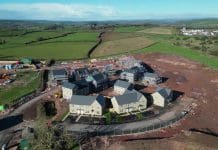Housing secretary Michael Gove has opened a consultation on plans to boost brownfield building in England’s 20 largest cities
Facing growing political pressure to deliver on housing targets in an election year, Michael Gove has announced new policies that seek to increase brownfield building in UK cities.
The Department of Levelling Up, Housing and Communities has opened a consultation on proposals that will make it easier to get planning permission if local authorities are not reaching housing targets.
Plans would also allow more commercial buildings to be converted into residential properties without planning approval, as well as removing restrictions on “new extensions or large loft conversions”.
Electric vehicle charging points and heat pump installations are also being considered in the consultation, which will close on at 11:59pm on 9 April 2024.
Rishi Sunak said on the plans: “We pledged to build the right homes in the right places – protecting our precious countryside and building more in urban areas where demand is highest. Today’s package is us delivering on that.”
Gove added: “Our new brownfield presumption will tackle under delivery in our key towns and cities – where new homes are most needed to support jobs and drive growth.”
Brownfield building could help regenerate urban areas
Craig Carson, managing director at Barratt West London, comments: “There is a scarcity of ‘obvious’ construction sites left, so many are now looking toward brownfield or even greenbelt sites. Making heritage assets a focal point for development can go beyond the regeneration of buildings and places; it can bring together communities and can foster a sense of ownership that encourages repeat use. Something we’ve seen that is popular among first time buyers and young professionals is that they want to be a part of something bigger.
“Using buildings to create homes and communal facilities like community centres, shops, cafes, sport centres and family play areas, not only injects life and vibrancy into these spaces but also encourages footfall into forgotten parts of towns and cities, kick-starting the permanent and sustainable development of the area.”
Melanie Leech, chief executive, British Property Federation commented: “We have long highlighted that the planning system is a brake on growth and housing delivery and we are pleased Michael Gove has responded to the call in our Manifesto to focus on the potential for urban brownfield sites to unlock millions of pounds of investment and deliver homes and jobs to support local prosperity. The Government must now ensure that local authorities are properly resourced to take advantage of these opportunities at pace.
“The extension to PDR may help bring some vacant properties back into use but this is not a silver bullet for housing delivery. Only a small number of buildings are likely to be suitable for homes and it is paramount that there is effective ‘quality control’ in place to make sure that we do not end up with poor quality homes in our town centres.”
Others decried it as “too little too late”
William Poole-Wilson, founder of workplace design and strategy architects, WILL+Partners said: “We have laboured under a planning system which, love it or loath it, is not fit for purpose. However, local authorities have insufficient resources to dedicate to an expensive planning system that has built up a level of bureaucracy which means that large applications need to be delivered in a van.
“At present, most local planning authorities don’t have the technical competency to know whether a design is missing an opportunity or has a technical flaw. Therefore, some significant upskilling will be needed to help ensure that all major projects are vetted on a like for like basis nationally, helping to remove inconsistencies in the system.”
Simon Cox, managing director at Walter Cooper: “It all feels very too little too late from Gove. With the next General Election just around the corner, to come out now and talk about the importance of building more houses feels like a last-ditch attempt at political point scoring.
“As an industry, we would be naïve to believe things will change, so we should take the announcement with a pinch of salt.
“To add to this, it’s all well and good committing to building on Brownfield and Greenbelt, but the problem is, there’s such strict rules around what constitutes these sites that they are going to need to relax the laws around this first before any development takes place on them.”

















